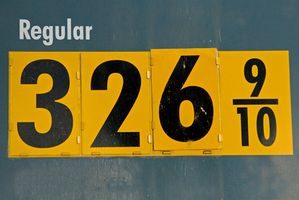An unexplained increase in fuel consumption by your car costs you money and is a symptom of potentially expensive problems. Identifying the reasons your car is burning more gas than it should and correcting them will save you money and help you to avoid costly repairs. Familiarizing yourself with the more common causes of poor fuel economy is a smart way to help keep your car running as economically and efficiently as possible.
Fuel leaks
Fuel leaks can cause a sudden drop in fuel economy and create a potentially dangerous fire hazard. You should suspect a fuel leak if you smell a strong gasoline odor near the vehicle or notice unexplained wet spots on the ground underneath your car.
Dragging brakes
Brakes can malfunction, causing a condition where they do not fully release. This increases the load on the engine, forcing it to work harder and burn more gas. Suspect dragging brakes if you notice excessive gray dust on wheels and tires, or the accelerator must be depressed farther than usual to achieve normal driving speeds.
Vacuum leaks
Vacuum leaks would cause a car to burn more gas than it should by introducing excessive air into the engine, unbalancing the fuel to air mixture. The engine compensates for this uneven fuel to air ratio by introducing more gasoline into the mixture to compensate for the increased air volume. A vacuum leak will typically cause rough idle, poor acceleration and misfires at operating speeds. Cracked hoses, worn out gaskets and loose fittings are common causes of vacuum leaks.
Clogged air filter
Air filters trap dirt particles, preventing them from entering the engine. Over time the air filter will become clogged with dirt particles, reducing its ability to allow the free flow of air into the engine. Symptoms of a clogged air filter are burning more gas than normal and poor acceleration.
Worn spark plugs
Worn spark plugs reduce an engines ability to burn all of the gas in the combustion chamber. Some of the gas remains unburned and is expelled into the exhaust. This reduces power, causing the vehicle to use more gas to do the same amount of work, lowering fuel efficiency. Worn spark plugs cause misfiring, reduced power, poor acceleration and reduced fuel economy.
Underinflated tires
Tires that are not fully inflated increase resistance to rolling, requiring more energy to move the car forward. The engine has to work harder to overcome this increased resistance, resulting in the car burning more gas than it should. Tire inflation should be checked regularly with a tire pressure gauge and kept at the manufactures inflation specifications.
Driving habits
Aggressive driving, jack rabbit starts, exceeding normal speed limits and excessive idling increase fuel consumption and should be avoided.

Reasons a Car Is Burning More Gas Than it Should
by
Tags:

Leave a Reply